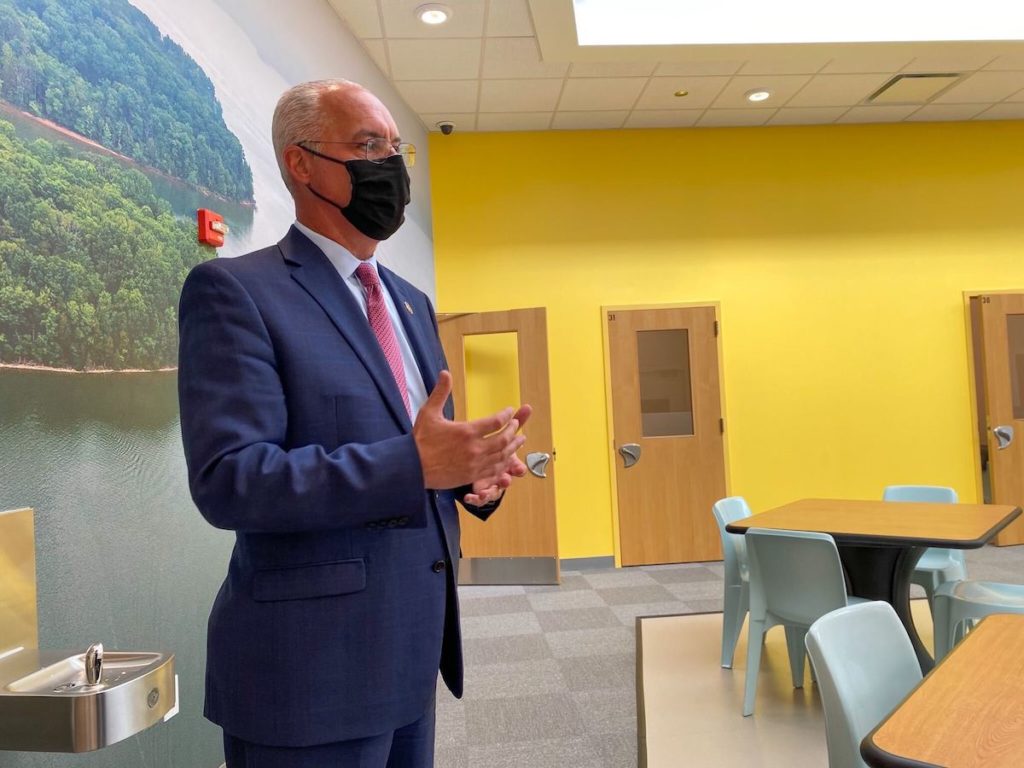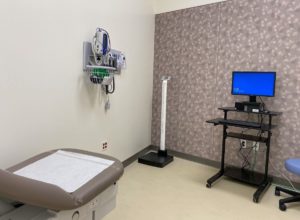
Starting this month, a new 60-bed facility will provide immediate mental health care for some people who are arrested in Nashville with a mental illness, rather than locking them in a jail cell.
Nationwide protests this summer have strengthened calls to spend less money on jails and more on mental health. The sheriff says he’s doing just that.
Davidson County Sheriff Daron Hall built the Behavioral Care Center, which opens this fall, with funding that was initially budgeted for the new Downtown Detention Center. And the therapeutic space stands in stark contrast with the white walls and orange jumpsuits that fill the county’s jails.
At the Behavioral Care Center, Hall says, patients won’t wear orange. Staff will wear scrubs, not correctional officer uniforms. And the rooms are designed to put patients at ease. In one common room, the wall is painted with a vista of a peaceful lake, and sea foam green rocking chairs sit beneath a flat screen TV.
Hall says all those details were intentional, to remind both patients and staff that the facility is for treatment, not punishment. And the goal is to help people as soon as they arrive at central booking.
“I’ve always been frustrated that we wait so long into the criminal justice process to do some programming, diversion and so forth, because, by then, they have a court date, a probation officer, at times, and fines and fingerprints and photographs and all that,” Hall says. “I’m trying to do it in a much earlier stage, where that’s avoided. Reduces the workload for courts, but it also puts a person in the hands of mental health right away.”
Once the center is up and running, everyone who’s arrested will receive a mental health screening. Those who qualify will go next door for treatment from specially trained sheriff’s office employees and clinicians from the Mental Health Cooperative.
Hall says the center won’t be equipped to treat the sickest patients. Instead, he says it will care for those who are between a one and an eight on a one-to-ten scale.
“People who belong in here are the ones who really wouldn’t have committed their crime had they been stabilized on their medication,” the sheriff says. “If not medication, their treatment. Because we incarcerate people for being ill. We’re the only modern country in the world that does that.”
Hall estimates about 30% of the local jail population struggles with mental illness. Nationwide, the Bureau of Justice Statistics has reported in the past that as many as 64% of people in U.S. jails suffer from some form of mental health issue and 31% have a major depressive disorder.
Hall attributes those numbers partially to people’s instinct to call the police when someone is experiencing a mental health crisis. Many cities, including Memphis, have created crisis teams that send mental health professionals in those cases, either in place of or in tandem with law enforcement officers.
But the sheriff isn’t counting on that happening anytime soon. Hall says the city has cycled through six mayors and six police chiefs since officials first promised to bring such a program to Nashville, without success. And he says the treatment center will fill the void as long people with mental illness are arrested.
“I want it to happen, but I’m tired of waiting,” Hall says. “The jail is where those individuals end up. And so, what I want to do is build something in case we have six more mayors.”
A look inside the new Behavioral Care Center:
 Samantha Max WPLN News
Samantha Max WPLN NewsPatients will receive medical care in private patient rooms, unlike in a jail, where sick people are often treated in crowded infirmaries.
 Samantha Max WPLN News
Samantha Max WPLN NewsThere are no bunk beds in the Behavioral Care Center. In this women’s room, sea foam green cots are lined with neutral-colored blankets and sheets.
 Samantha Max WPLN News
Samantha Max WPLN NewsHall says he wants the décor at the treatment center “to take your breath away.”
 Samantha Max WPLN News
Samantha Max WPLN NewsTables in the sitting room are decorated with two-dimensional checkerboards.
Samantha Max is a Report for America corps member.

